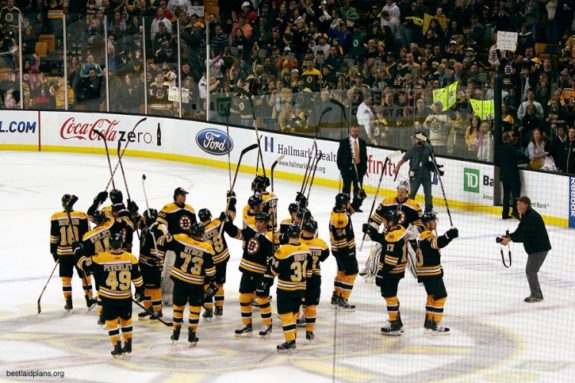When Don Sweeney took over as general manager of the Boston Bruins, one of his most daunting tasks was rescuing the franchise from their salary cap issues. With the summer trades of Reilly Smith, Dougie Hamilton, and Milan Lucic, he cleared out a lot of future cap space, without taking much, if any, back in each deal.
These deals not only brought Boston the freedom of added cap flexibility, but also brought back a surplus of draft picks, infusing a wealth of young, cost-controlled talent into the system. In doing so, Sweeney created the potential for a great problem, too many skilled players on cheap contracts to fit into the lineup.
[RELATED: Bruins Full Salary Cap Info]
In recent memory, this team has been built with an emphasis on depth and balance throughout the roster. By avoiding a reliance on any one player, the team had been able to overcome individual slumps and maintain success over long stretches of time. The question going forward is can the Bruins afford to have upwards of $14 million tied up in their top two centers, and if so, is this the duo, David Krejci and Patrice Bergeron, that should receive that commitment?
Before we go down this road, it’s important to recognize that these two players were the top two centers for the Bruins when they won the Stanley Cup in 2011. So it has been established that they can win with these two players in their current roles.

A crucial difference between then and now lies in the finances. In the 2010-11 season, Bergeron had a $4.75 million cap hit, while Krejci counted for $3.75 million against the cap. At that point, the cap ceiling was set at $59.4 million, meaning that the combined $8.5 million between the two centermen accounted for just over 14% of the team’s salary allowance.
Fast forward five years, Bergeron’s cap hit has been bumped up to $6.875 million, while Krejci has become the team’s top paid player with a $7.25 million cap number. Fortunately, the cap ceiling has increased with the times, now set at $71.4 million. Even with the increased salary cap, the pair now counts for just shy of 20% of the team’s allotted cap space.
To take that a step further, entering the Stanley Cup year, Krejci was 24 years old, while Bergeron was 25. Krejci was in the midst of a three year deal, while Bergeron had just signed a three-year extension that would keep him in Boston through his age 28 season.
Now, Krejci is 29, entering the first year of a six-year deal, which would keep him in black and gold until he is 35. Bergeron is 30 years old, entering season two of an eight-year extension that will keep him in Boston through his age 36 season.
David Krejci
While both players excel on the ice, they have very different styles. Krejci’s game is more predicated on the offensive aspect of the game, generally classified as a playmaking center. He likes to slowdown the game in front of him, surgically picking apart defenses with his precision passes.
One of the biggest knocks on Krejci has been his stretches of inconsistency throughout the regular season. For one reason or another, he seems to go through a particularly rough stretch each season, where his point production just completely craters. Despite these stretches, Krejci has been one of Boston’s top three point producers in six of the last seven seasons, with the one exception being an injury marred 2014-15 campaign.

Beyond that, Krejci has been an offensive force in the playoffs. In each of Boston’s runs to the Stanley Cup Finals, Krejci has been the league’s top postseason producer. In 2011, he led the league in postseason goals (12) and points (23). His goals created (9.5) was far and away the best in the league for that postseason, as Boston went onto win the Stanley Cup. In 2013, he led the league in postseason assists (17) and points (26). His goals created fell to 9.4 that year, which was an impressive 1.8 goals created above Patrick Sharp, who ranked second with 7.6.
Unfortunately, he hasn’t been able to channel that second gear every season. Krejci mustered just three postseason points in seven games in 2012, as the Bruins made an unceremonious exit from the playoffs. Two years later, Krejci put up just four assists in 12 games, as Boston was knocked out in the Eastern Conference Semifinals by the Montreal Canadiens.
Patrice Bergeron
Unlike Krejci, Bergeron is not known specifically for one aspect of his game. Yes, he has won the Frank J. Selke award for the league’s best defensive forward three times. He has also put up 30 or more goals in multiple seasons and led the league in plus/minus. Then right in the middle of offense and defense, he is one of the league’s most dominant faceoff men. He is the epitome of an all-star caliber, two-way center.
Defensively, the trophies speak for themselves. Bergeron has won the Selke in three of the past four seasons. He is a critical member of Boston’s penalty kill, which has been one of, if not, the best in the league over the last decade.
His offensive production has never been in question. At 18, he entered the league as a power forward, forcing his way onto the team out of training camp. Following the lockout, he posted what are still career highs in goals (31) and points (73). He has remained a consistent presence on the score sheet, ranking among the top five point producers for the Bruins in every season dating back to the 2009-2010 campaign, leading the team twice in that span.

While plus/minus isn’t the perfect stat, it does a solid job to reflect Bergeron’s importance at both ends of the ice. In the four seasons between 2011 and 2014, Bergeron amassed a +118. That would be remarkable for any player, but considering the significant role Bergeron plays in stymieing opposing team’s top lines, it is hard to comprehend.
Bergeron’s faceoff skills are revered across the league. To find a season where he has finished outside of the top 10 in the NHL in faceoff wins, you would have to go all the way back to 2008-09. To dig a little deeper, he has finished in the top five in each of the last five seasons, while leading the league in three of the last four years.
Bergeron’s value extends beyond his on-ice performance. He was named an alternate captain at age 21, a role that he has maintained for going on 10 seasons. He has long been considered the heir apparent for the captaincy when Zdeno Chara hangs up his skates. He is a locker room leader, but also a player that leads by example. Even when his production is not up-to-par, his effort and intensity levels never seem to dip.
So does the team really need to choose? On paper, the two centers appear to complement one another perfectly. One is an offensive, albeit somewhat streaky, machine that can handle the top scoring line duties, while the other can shut down opposing team’s top lines, while still contributing at a top line rate.
It really boils down to whether the team could reallocate that money and bring in more affordable, high-end talent in via trade or free agency if they moved one of the players, while also promoting their cost effective draft picks through the system.
It is difficult to envision a scenario where Sweeney moves either of these two players and does not immediately set the team back. The other team would have to have the cap space to fit either player under the cap ceiling, plus be willing to trade extremely valuable assets to make the acquisition. Most teams that can afford a top line center, who is under contract for at least six years, are not dangerously close to being a Stanley Cup contender.
Personally, I would hold onto both players and attempt to ride that wave to another Stanley Cup. If I had to move either player, I would shop Krejci, as I think it’s easier to replicate his offensive production than everything else that Bergeron brings to the table. But again, I would do whatever it takes to make sure these two remain on the roster for the foreseeable future.
Do you think Boston is better off moving either of these two? Who would you move if one of them had to go? Let me know what you think in the comments below or on twitter.